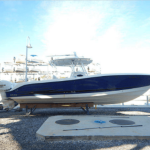
Marine surveys should be performed regularly to ensure that boats and ships meet certain levels of safety and operating standards. A certified marine surveyor 32084 inspects all aspects of the vessel, from its exterior and interior fittings to engine controls and beyond. At the end of the survey, you will be provided with a detailed survey report.
When doing their work, a marine surveyor 32084 will use a comprehensive checklist to assess each item on board. Knowing what goes into a marine survey checklist can help boat owners and captains understand what needs to be included before the surveyor arrives. In this post, we will be providing an overview of the components of a marine survey checklist.
Condition of the Hull
No matter what type of vessel is being surveyed, one of the most important factors is the condition of its hull. The surveyor will inspect the external structure for any visible evidence of damage or deterioration due to corrosion, impact, hydrostatic forces, or other causes. Any cracks, fractures, soft spots, or other signs of failure should be noted in the report.
If necessary, further examination of the bottom or internal structure might require penetrating more than the outer layer of the hull plating. This could include ultrasound testing if delamination is suspected. The surveyor is trained to recognize all signs of weakness that could have been caused by age, water absorption, or installment issues.
Interior Fittings
The surveyor will carefully inspect all existing fixtures and fittings inside the vessel. Deck hatches, cabinets, cupboards, bilges, trees, windows, and hardware must all be examined for their security, safety integrity, and general condition. Any signs of wear and tear or broken parts should be noted in the assessment report.
Safety-Related Equipment
The surveyor will check all onboard safety items to make sure they are working properly and up to current regulations. Fire extinguishers and firefighting systems will be inspected for operation capacity and pressure levels; personal flotation devices (PFDs) should also be checked for proper fit and function. Navigation aids such as radar reflectors and life rafts should also be examined during the survey.
Engines and Fuel System
The engine room is another area where a certified marine surveyor could provide valuable information regarding the condition and safety of your craft. The surveyor will conduct algorithmic tests to evaluate the functionality and efficiency of the engines, as well as check all fuel lines for potential leaks or blockages. Furthermore, any rudders and shafts should also be assessed visually for stability and wear and tear.
Electrical Systems
The electrical equipment on board needs to be verified according to local regulations. That means checking all wiring against current codes, testing all outlets and switches as well as inspecting batteries and battery banks for sufficient power supply. All areas with high voltages should be marked as part of the survey checklist.
Steering Test
To make sure that the vessel maneuvers safely in all conditions, the surveyor will usually perform a test steering session at various speeds. The rudder should move freely without obstruction when turning towards both starboard and port side equally. Any looseness or stiffness on either side should be recorded in the final report.
Final Review
Once all these checks are completed, the surveyor can then provide an overall assessment of the boat’s condition based on all observations noted in the checklist. If there are any discrepancies or deficiencies found during the assessment process, they must be addressed before the vessel can be certified as safe for operations on open waters.
For many boat owners, preparing for a marine survey can seem overwhelming. However, understanding what marine surveyors look for during their inspections can help provide some peace of mind while undergoing this important process. It is crucial for boaters to remember that each item on a marine survey checklist plays an essential role in determining whether a vessel is safe enough for operation at sea. For more assistance with marine surveying matters, please contact Suncoast Marine Surveying today. We are here to answer any questions you may have about marine surveys and offer the professional marine survey services you deserve.



